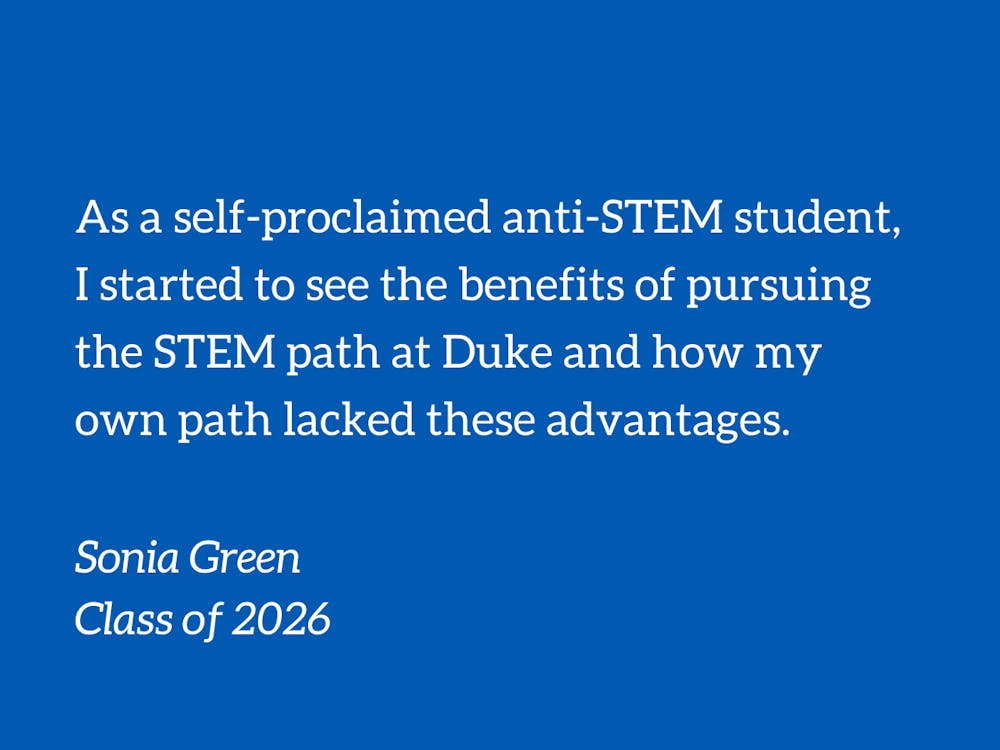What picture comes to mind when you think of the stereotypical STEM student? Are they stressed? Do they struggle to balance their workload? Do they procrastinate or do they work hard and play equally as hard? Regardless of what exactly you imagine, I’m pretty sure that privilege was not a part of that image. I’m not talking about the fact that STEM students are overwhelmingly white or Asian and male or the fact that their careers generate higher salaries. I’m talking about the privilege that comes with studying STEM and how the Duke community treats students because of it.
I am not a STEM student. I never liked math. I always saw science as just another subject in school. And I never grew up with dreams of working in medicine, engineering, or a technology field. I preferred reading in English class and learning about culture in history class. I never considered this to be odd until I came to Duke. Here, it felt like everyone I met wanted to do one of three things (outside of law and consulting of course): go to medical school, become an engineer or major in computer science so that they could work at some tech company. And I wasn’t wrong. A recent survey from the career center found that the top five industries Duke students enter are technology, finance, business or management consulting, healthcare and medicine and science or research. I felt like no one wanted to write books, or make movies or learn about people and culture. As a self-proclaimed anti-STEM student, I started to see the benefits of pursuing the STEM path at Duke and how my own path lacked these advantages.
Whenever I told someone I planned to major in African & African American Studies, I was always asked what I wanted to do or given a smile and a “that’s cool." Many Duke students don’t even know what non-STEM students actually study. If you ask a Duke student to define cultural anthropology or describe what ethnic studies students are learning, they most likely cannot. But should the conversation switch to biology, chemistry or computer science, their faces light up.
How have we as a campus so easily coded STEM majors as normal while viewing the humanities and social sciences as foreign and in some cases useless? Why do we respect the rigor of labs and problem sets, but call other students “lucky” when they must read an assigned book in only a week or fully develop an original creative concept in just a few days? We are constantly told that there will be countless job opportunities available to us that have not been created yet, such as social media marketing. Then we as a society turn around and tell students in college to focus on building marketable skills (which is often just code for STEM skills like coding) and creating a stellar resume. How have these ideas translated into a greater push towards STEM?
STEM students are also privileged in terms of resources. Whenever the university allocates funds or comes across new resources, it seems like these departments always eat first. The history department sits in the Classroom Building on East Campus, across from Friedl which is home to the AAAS and cultural anthropology departments, while engineers quite literally have an entire quad to themselves. Even the quality of the classrooms varies. There are still chalkboards on campus used by — you guessed it — non-STEM professors. How are STEM buildings able to have such beautiful architecture and large glass windows, yet social science buildings are often in inconvenient locations that lead many students to avoid taking those courses? Let’s be honest; traveling to Friedl, or the Classroom Building, or East Duke or Smith Warehouse when you don’t live on East Campus is not the most convenient. Yet, it’s something that I and many other students do every week.
Even in terms of community, STEM students are privileged. Any room that they walk into they can be sure that at least one other student studies something under the STEM umbrella, and in many cases, it’s easy to find someone in their department. I have been in many rooms with pre-med, Pratt and computer science students where I was the odd one out. I was the one who said no to STEM. Even as a double major in AAAS and Visual & Media Studies, I struggle to find peers who are majoring in either department. Many social science departments at Duke have very few majors and finding a social science student who doesn’t study public policy is also a real challenge. You have the occasional STEM and humanities double major or the STEM students with a social science minor but overall, being a non-STEM student is isolating and can be lonely. Who do you talk to about your classes when your friends are all pre-med? Who do you study with when you’re surrounded by engineers? What upperclassmen can you turn to for advice when they all study computer science?
Learning to navigate this experience at Duke was an adjustment. While STEM students have no control over the resources they receive or the facilities they are given, we must acknowledge that there is some privilege there. By no means am I implying that STEM is easy. However, we must create space for non-STEM students to feel heard and let them know that whatever they choose to study is valid. STEM students are also responsible for educating themselves and using what few opportunities they have to take courses that teach them something different or challenge them in a new way. I believe that the humanities and social sciences provide useful skills that we all need to develop. Maybe then it will become clear that everything at Duke is valuable, not just STEM fields.
Sonia Green is a Trinity junior. Her column typically runs on alternate Tuesdays.
Get The Chronicle straight to your inbox
Signup for our weekly newsletter. Cancel at any time.

